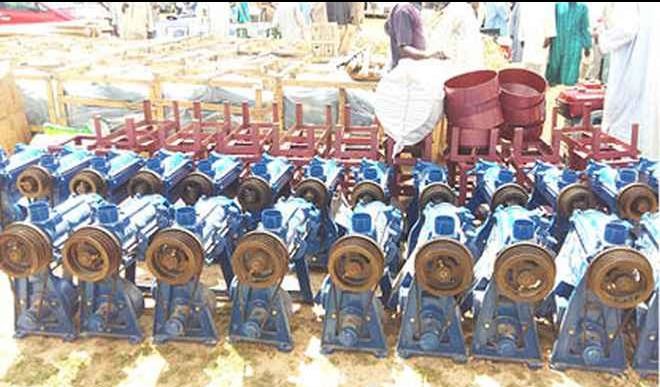Jigawa builds virile micro-economy in rice production hubs
Virile micro-economic activities are expected to be set up in the rice production hubs in Jigawa State before the next harvest season. This is because yield in rice production is expected to increase following the distribution of smallholder farmer implements for each segment that formed part of the complete circle in rice value chain production. […]


Virile micro-economic activities are expected to be set up in the rice production hubs in Jigawa State before the next harvest season.
This is because yield in rice production is expected to increase following the distribution of smallholder farmer implements for each segment that formed part of the complete circle in rice value chain production.
The idea of mechanizing the manual processes in agriculture is to increase efficiency and productivity because over 80 percent of the population of the state is made up of small scale farmers whose limited output and lack of capacity impacts negatively on productivity.
Since rice production holds one of the state’s greatest potentials for economic transformation, premium is therefore placed on the provision of smallholder farmer implements that cover the full circle of rice value chain, starting from seeds, planting, cultivation, harvesting, threshing and milling.
In order to build a sustainable platform, group of youth were selected for intensive training on all aspects of the value chain and through whom the implements will be distributed.
The provision of the equipment will also help in no small measure in complementing rice production under the new cluster farming system introduced in the state in the last two years.
Under the new farming system, over 40,000 farmers have keyed into the new programme which led to the cultivation of over 30,000 hectares.
It is envisaged that current productivity yield of rice will increase from 2.5 metric tonnes per hectare to an average of 7.5 tonnes per hectare in the next three years.
In order to encourage healthy competition among farmers that bought the idea of the new farming system, the state government introduced prizes for farmers and extension workers that have exhibited outstanding performance.
Cluster farming system does not only limit itself to rice farming.
Other crops include sesame, groundnut and wheat were also captured under the scheme.
Shortage of agro-input has been identified as a major impediment militating against agricultural growth.
It is in view of this the state government recapitalized the state input supply company for procurement and distribution of fertilizer, seeds, agro-processing and agro-chemicals.
Speaking during the distribution of agricultural equipment in Dutse, the state capital, the Commissioner of Agriculture, Kabir Ali, said glut at peak harvest period due to lack of processing and value addition facilities led to high post-harvest losses, adding that the political will demonstrated by the present government by increasing budgetary allocation from N2.9 billion in 2015 to N6.9 billion in 2017 would go a long way in not only tackling the problems but also improving output.
“It is envisaged that with the current productivity effort in place, yield of rice, sesame, ground nuts, soybeans will increase to an average of 7.5, 1.0, 1.5 and 2.5 MTs/Ha respectively in the next three to four years,” he said.
In his remark, the state governor, Muhammadu Badaru Abubakar, said practical steps had to be taken by his administration in order to make agriculture as the mainstay of the state economy, adding that this became imperative taking cognizance of the fact that some states are finding it difficult to meet their recurrent expenditure.
He said for the state to create a virile economy, all aspects of rice production in the value chain circle had to be supported hence, the provision of affordable farming equipment capable of mechanizing the process at every stage of the rice value chain.
“Over 80 percent of our citizens are engaged in agriculture and nearly all of them are small scale farmers, whose limited output and lack of capacity impacts on productivity. In light of this, the state finds it imperative to focus on this sector since, it holds the greatest potentials for economic transformation.
“We are launching our seed to market rice value chain programme that complements every aspect of the rice production cycle. Under this scheme, planting, cultivation management, threshing and milling have been incorporated in an intervention initiative that completes the rice value chain full circle and will mechanize these manual processes to improve efficiency.
“Twenty-five tons capacity rice mills will also be distributed to selected agro entrepreneurs in the heart of our rice production areas, while paddy rice dealers will be empowered with capital to ensure constant supply of feed stock for the mills.
“Rice dealers will be integrated into the cycle and also to be provided with capital to buy up the finished products and distribute across the wholesale and retail outlets within and outside the state.
“We will distribute the following items to youth, who have met the criteria for participation and have been trained extensively across the state: 100 rice and wheat threshers of 200 kg per hour; 100 rice mills of 200kg to 700kg per hour; 100 multipurpose planters; 100 double row multipurpose planters; 300 hand held rice/wheat harvesters and 574 manual sprayers,” Governor Badaru Abubakar said.
